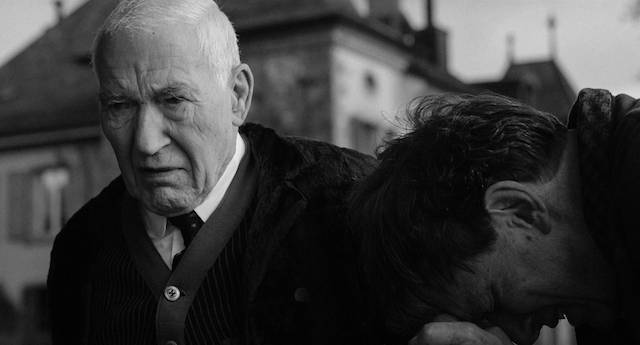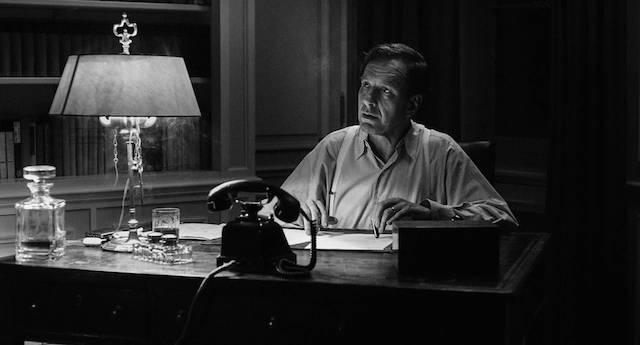Switzerland isn’t exactly famous for parading its history during WWII. Remaining neutral from the conflict like its neighbour Liechtenstein, the Swiss benefitted from financial and armament deals with Nazi Germany, turned away Jewish refugees at the border and, post-war, failed to inform the remaining families of Holocaust victims about the deposits left by dead relatives in Swiss banks.
While there has been some examination of this dark history in Switzerland itself over the years, it’s not a story that has been turned into movies or tv dramas that have played outside the country itself. This makes A Forgotten Man something of a novelty – the film portrays what happened to the Swiss ambassador to Germany when he returned home in 1945. Director Laurent Nègre has adapted the play Der Gesandte into a brisk 85-minute feature, crisply shot in black and white and very well acted, if a touch stagey in its more expository dialogue scenes.
Loosely following the biography of the Swiss ambassador Hans Frolicher, here renamed Heinrich Zwygart, the title A Forgotten Man doesn’t just refer to the diplomat, who oiled the wheels for Swiss financiers and weapons manufacturers business arrangements with Germany and also aided the restriction of Jewish people trying to escape to Switzerland. The title also refers to Maurice Bavaud, a twenty-five year old Swiss student who attempted to assassinate Hitler in 1938. The Nazis apparently offered to exchange the imprisoned Bavaud for a captured German spy, but the ambassador publicly condemned the young man and he was executed in 1941.
Nègre opens A Forgotten Man with a glimpse of a young man in shirt-sleeves being dragged down stairs to a cellar by German soldiers before cutting to archive of bombs falling and the news that Hitler is dead. Telescoping the events at the end of the war, we see Zwygart (played by Michael Neuenschwander), an elegantly dressed middle-aged man, burning documents in his Berlin apartment, including photographs of himself standing alongside Hitler, Goering and other high ranking Nazis.
After the film’s title appears, the action cuts to Switzerland where an exhausted Zwygart is being driven to his palatial family home. There’s a publisher who wants him to write his memoirs, but otherwise he’s not made to feel particularly welcome by Swiss politicians who are eager to cosy up to the Allies and downplay the country’s links to Nazi Germany.
Expecting a seat on the Federal Council, Zwygart is increasingly angered at being ostracised politically and dismayed to find his once grand household depleted of staff. The daughter he last saw as a child is now a young woman, in love with a boyfriend who wants to take her to America, but not before he has interviewed Zwygart for a student newspaper in depth about his war record.
 His elderly father (Peter Wyssbrod above), a colonel in WW1, believes that neutrality was a sign of weakness and that Switzerland should have fought the Germans. He makes his disapproval of his son clear. Only Zwygart’s wife remains solidly devoted to him but she cannot assuage the nightmare visions he keeps having of the dead Maurice Bavaud. In an impassioned scene, the boy’s mother confronts Zwygart and accuses him directly of failing to prevent her son’s execution.
His elderly father (Peter Wyssbrod above), a colonel in WW1, believes that neutrality was a sign of weakness and that Switzerland should have fought the Germans. He makes his disapproval of his son clear. Only Zwygart’s wife remains solidly devoted to him but she cannot assuage the nightmare visions he keeps having of the dead Maurice Bavaud. In an impassioned scene, the boy’s mother confronts Zwygart and accuses him directly of failing to prevent her son’s execution.
In a country where as one character puts it, “our only raw material is other people’s money”, the Swiss are keen to get on good terms with America and move on. In an interesting twist, Zwygart goes to the US embassy to tell all, but finds that the Americans at this point in history, are keener on Switzerland becoming a strong ally against Soviet aggression than uncovering the country's Nazi complicity.
A Forgotten Man would have benefitted from its director having more confidence in the impact of this innately grim history on the audience, without having to resort to quite so many apparitions of the ghost of Bavaud. The film doesn’t need these rather shrill moments of horror to convey how haunted and trapped the ambassador is by his wartime record. But that proviso apart, this is a movie well worth catching in the cinema.















Add comment